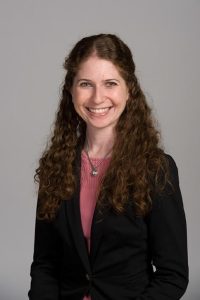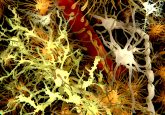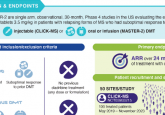Advice to my younger self with Carrie Hersh

 For International Women’s Day 2023, we interviewed Carrie Hersh. Carrie is the Director of the Multiple Sclerosis Health and Wellness Program and Associate Program Director of the Multiple Sclerosis and Neuroimmunology Fellowship at Cleveland Clinic Lou Ruvo Center for Brain Health (NV, USA). She is also Associate Professor of Neurology at Cleveland Clinic Lerner College of Medicine of Case Western Reserve University (OH, USA). In this interview, Carrie discusses her career inspirations, finding networks and advice to her younger self.
For International Women’s Day 2023, we interviewed Carrie Hersh. Carrie is the Director of the Multiple Sclerosis Health and Wellness Program and Associate Program Director of the Multiple Sclerosis and Neuroimmunology Fellowship at Cleveland Clinic Lou Ruvo Center for Brain Health (NV, USA). She is also Associate Professor of Neurology at Cleveland Clinic Lerner College of Medicine of Case Western Reserve University (OH, USA). In this interview, Carrie discusses her career inspirations, finding networks and advice to her younger self.
Tell us your career story
My career is based off a series of inspirations. First, I was inspired by my dad, a renowned psychologist, during my early childhood growing up in Miami (FL, USA). He taught me the importance of being true to myself while being in the service of others. I knew from a very young age I wanted to be a doctor, and this was further cultivated during my time at University of Florida (FL, USA) when I was invited to join a neurobiology research group studying the effects of acute and chronic stress on the hypothalamic–pituitary axis. My next inspiration was here, through the mentorship of a PhD neuroscientist who opened the doors to the neurobiology of learning and memory. Then, it became a ‘no-brainer’ (no pun intended) that my future entailed a career in neurology. I studied medicine at Nova Southeastern University College of Osteopathic Medicine (FL, USA) where I graduated with honors. Being true to myself, as my dad taught me, I indeed went on to study adult neurology. Cleveland Clinic (OH, USA) was my next stop where I completed my neurology residency program, and after receiving further inspiration from various well-respected experts at the Mellen Center for Multiple Sclerosis (MS) Treatment and Research (OH, USA), I completed an MS and neuroimmunology clinical and research fellowship, also earning a master’s degree in clinical research at Case Western Reserve University.
I currently direct a health and wellness program for MS at the Cleveland Clinic Lou Ruvo Center for Brain Health where I also serve as associate program director of the MS and neuroimmunology fellowship. I have continued to acquire mentors, coaches and sponsors along the way, who have continued to support me – and push me when needed. Knowing that my path is to secure the coveted academic position of full professor, I was appointed associate professor of neurology, just 7 years outside my training. What inspires me now is being a role model to aspiring young professionals, gender equity work for women in medicine through various task force and steering committee roles and national workshops, and coaching peers in my institute on the importance of living by their core values and professional engagement in burnout prevention. My research on real-world evidence in MS treatment also continues to inspire me, contributing to the scientific community so that we may better personalize treatments for patients.
What resources/networks have you found useful in your career, particularly as a woman in science?
I have found a wonderfully supportive network of mentors and coaches at my institution and other academic organizations in which I serve different roles (e.g., American Academy of Neurology, Consortium of MS Centers). Finding individuals who not only will teach and mentor you, but will also sponsor, elevate and speak out for you for professional opportunities is key. Also, finding a network of peers and ‘sage elders’ who you trust is essential. I have also found professional coaching (both as a coachee and as a coach myself) inspiring and truly informative in building and growing in my career.
What are you most excited about in the years to come, especially around women in science?
I am most excited about seeing the growing number of women in top leadership positions at medical institutions and other organizations and more women being promoted to associate and full professor academic standing.
What are the best aspects of your job? What are the most challenging parts?
Best aspects – getting to take care of people every day and make their lives just a little bit easier (and in some cases, a lot easier) is one of the most rewarding things I can do in my career.
Challenging parts – having to navigate the realities of practicing medicine (e.g., insurance denials, out of network insurance coverage, health disparities) and the business of medicine can be quite challenging. I have also found that being a woman in medicine has its unique set of challenges when encountering folks and groups of people who have fixed mindsets on a ‘woman’s place’.
Shoutout anyone who has inspired or helped you along the way
My mentors, sponsors and true inspirations for my growing career in academic neurology:
Mary Rensel: Director of Pediatric MS and Health and Wellness Program (Cleveland Clinic Mellen Center for MS, OH, USA).
Amy Sullivan: Director of Neurological Institute Professional Engagement and Director of Behavioral Medicine Program (Cleveland Clinic Mellen Center for MS).
Advice to your younger self?
Have the confidence to always be your authentic self and lead bravely with integrity, passion, grit and grace.
You might also like:





